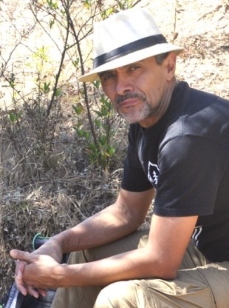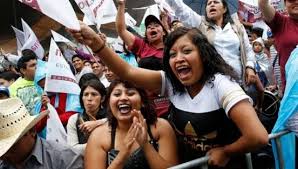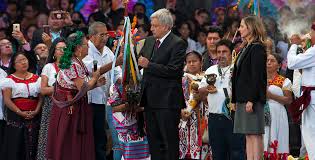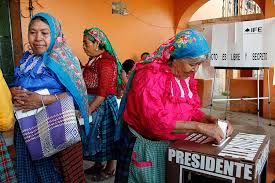
What are the biggest challenges for Morena and for the party’s membership?
We must advance the social movement for political change to the left, away from corruption and toward a fair distribution of our national wealth.
Morena must become a critical and self-critical collective organization that gives the historical and ethical basis for universal human dignity and for popular democracy.
We use the phrase “buen vivir” (“good life for all”) to reflect the society we wish to build instead of terms that reflect eurocentric experiences that have not come close to the original peoples of our continent and the Caribbean.

30 million people voted for Andrés Manuel. Before the election some said that many Mexicans were prepared for another defeat, but not for victory. Now that AMLO is president, millions more support for him and Morena has grown enormously. Your perspective?
I believe that many mexican@s were prepared for victory, not defeat. Millions of youth, people of all ages built the foundations of this change led by López Obrador, but he did not do it alone. The national project led by Andrés has been built collectively since 2010 when we formed as a movement. Based on the peoples’ historical struggles for democracy, we have grown, we have multiplied, we have created structure, we have made ourselves visible. Before the election, all national polls showed the growing and irreversible tendency towards victory of the Morena project and of López Obrador.
To defeat corruption in Mexico it seems that radical surgery of institutional policy is required, something never done before. What are the roots of corruption, and is it possible to eradicate it?
Yes, it can be eradicated because it is a historical, not a metaphysical phenomenon. Corruption is the exercise of socially negative functions. It is a cultural and political phenomenon that has historical origins: Politically and socially it is the individual or collective practice of appropriating the property of others, to seize possession of it for their interest and thereby breaking basic community ethics. It is the denial of the dignity of others and enforces the assumption that certain beings are superior to the “non-beings” who are without rights; the historical bloc of the dispossessed, the excluded. Those with power and privilege are the exploiting class, or are those who enter the class of those who hold power.
We believe that the resolution of the theoretical and practical basis of corruption in capitalist México is realizable. Conservatives and the right-wing on the other side, consider corruption eternal, normal, even natural. This is why as reactionaries they are afraid of change, afraid of democracy.
We now have new laws that mandate that those guilty of corruption may go to prison. This is something that the right has never suggested, much less proposed, because corruption is the basis of their impunity.

What are the most urgent changes that will favor the poor and working people? What aspects of Morena’s program will improve the Mexican people in the immediate and long-term?
Specific reforms have been initiated to distribute more evenly income in the form of raised salaries, pensions, scholarships for education. The right-wing hoarded social benefits which were reduced to virtual non-existence for the poor and working classes. Benefits did not reach them, but remained the personal assets of the elite, the bureaucracy of a perverse structure of thieves.
This new equitable distribution of income – with the right to social benefits and the right to live without corruption – is a means to carry out urgent reforms for the good of the excluded in our country.
In the long term, we expect to create a new state, a liberated and self-reliant people conscious of and capable of defending their rights.
Morena was formed as a party only four years ago. The vision of Andrés Manuel is extraordinary. What does he expect to accomplish during his six-year term?
López Obrador and his project assume that the people will deepen their social consciousness, will understand their fundamental role is to create their own destiny and history of our country. Our people have the potential to leave behind the filthy and sad times dominated by a mafia of power represented by the PRI and PAN parties.
To cleanse the country of corruption implies making feasible social policies that neoliberalism has destroyed.
You have mentioned that Morena has a National School of Political Education for its militants. What is the purpose of this school?
The National Institute of Political Education will focus on developing the necessary categories for our people to achieve self-constitution in social, autonomous power, with a collective ethic as a political nucleus.
We expect that process to, a) organize our militant cadres, b) put forward candidates in each electoral year, and c) promote an advanced political awareness of the people. Our cadres, who represent the enormous diversity of identities in México, must employ a critical and liberating discourse. Elected candidates must undergo a process of political consolidation to reinforce their capacity for analysis and debate and prevent them from fetishizing (betraying the community to enrich themselves or empower themselves individually). The major challenge, however, is to build an advanced political foundation of our enormously diverse society. Our people will need tools to liberate them from their old ways of thinking.
Mexico has been one of the most dangerous countries in the world for journalists. Why?
The system of corruption-impunity is a national network created by the political right, and critical journalism challenges the perversity of reaction. It places in critical view the neoliberal system and its integral parts.
For Morena, journalism is either critical, or it is not journalism. The beneficiaries of this corrupt network are the first to silence the voices of critical journalism. For that reason, even with our new federal government, murders of journalists have continued. On a local scale, corrupt powers continue to exist within the states of the country, such as mafias or drug cartels or organizations that steal gasoline with impunity. The process to end the violence could take several years. Very important to mention are the mining companies, principally Canadian, that exploit the land’s resources and the workers. In a future interview or discussion, we can talk about life and death struggles in México’s labor movement.
What about ex-members of the PRI or PAN, or the PRD, who now want to jump over to Morena?
Each citizen of México has the constitutional right to join the political party of his or her choice. Morena cannot prevent members of civil society from joining their ranks, even if they come from right-wing parties, or are gangsters from PAN, PRI or PRD. What Morena can do is apply the rules expressed in its constitution so that the behavior of its members adheres to the basic documents of our party, including our Declaration of Principles, our General Statute and Plan of Action.

Is it possible that some form of strategic or tactical unity between the Zapatistas and Morean can be forged for national salvation?
Realistically, I think the best thing that can happen is that the Zapatistas continue to be an inspiration for indigenous autonomy, the creation of cooperatives, of community ethics with the Caracoles (autonomous cooperative Zapatista communities), for example. It is possible, and we would hope, that their projects can nurture the militancy and candidacies of Morena. However, given the differences between Morena and the Zapatista movement, there may be no short-term possibility for a strategic or tactical unity.
Donald Trump says Venezuela, Cuba, and Nicaragua are the “axis of evil” and threaten US national security. What does AMLO say about this?
The foreign policy of the Mexican state, for historic reasons (we have been invaded 14 times just by the USA) is guided by the principle of non-intervention in the internal affairs of other countries. That is the policy our people expect from the international community towards us.
México promotes the peaceful resolution of disputes as a democratic principle of international relations. The PRI and PAN parties, beholden to the interests of the United States, eliminated these principles; that situation is now being reversed by our current government, which promotes dialogue between nations and not a discourse of power and threats.
What can Morena do to support Mexican@ workers in the United States?
Provide them with all the social benefits as basic rights of those who live and work outside our country. Contribute to their self-organization in Morena committees wherever they live and work. Defend their human and labor rights through our consulates.
How can progressive activists in the United States support Mexican immigrant workers?
First, participate in the cultural and political activities of our people in the US. Engage with them with honesty and humility, and offer them the knowledge and skills that you as activists have. Second, offer legal and moral support to immigrant movements for human and labor rights. On that basis we may one day talk about strategic alliances between the oppressed peoples of both countries for our self-liberation.